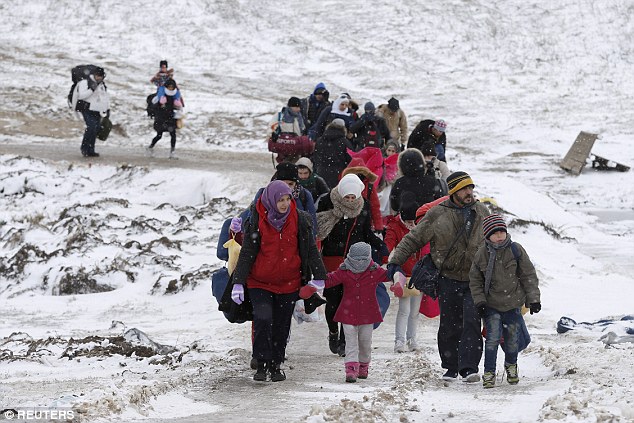The Mail — Macedonia has closed its border with Greece to migrants and refugees in order to stem the flow of people trying to pass through the country, police in Skopje said Wednesday.
The drastic move left some 650 asylum-seekers stranded at a border camp overnight as temperatures dropped to -8 Celsius.
It is believed children are among the hundreds stuck in freezing conditions after Macedonian authorities closed the border on Tuesday evening.

The 650 people stranded at the border are all from Syria, Iraq and Afghanistan, Greek police said today.
People from those countries are recognized as refugees by Balkan countries and normally allowed through on their way to Germany and other EU members.
The Skopje police official said the move stemmed from problems with Slovenian trains that had disrupted the flow of migrants, but the Slovenian rail company Slovenske Zeleznice insisted they were running as normal.

Long walk: Migrants walk through a frozen field in Serbia after crossing the border from Macedonia, near the village of Miratovac
The decision to close the border on Tuesday evening left some 600 people stranded at the frontier overnight as temperatures dropped below freezing
The rail company wrote on its website today that technical problems had disrupted traffic at the crossing with Croatia and trains were being replaced temporarily with buses.
However, a spokesman for Slovenske Zeleznice told Slovenian news agency STA that migrants ‘have been travelling undisturbed so far’.
Serbia meanwhile said that from Wednesday, it would only allow migrants to pass through the country if they were specifically seeking asylum in Austria or Germany.
The move comes after Austria signalled last week that it would follow neighbouring Germany’s lead and begin turning back any new arrivals seeking to claim asylum in Scandinavia.
The Serbian minister for migrants issues, Aleksandar Vulin, said in a statement that migrants ‘will not be able to continue with their journey unless they express intention to seek asylum on the territory of Austria and Germany’.






